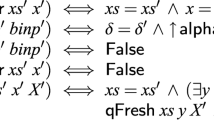Abstract
This paper is about completely formal representation of languages with binding. We have previously written about a representation following an approach going back to Frege, based on first-order syntax using distinct syntactic classes for locally bound variables vs. global or free variables (Sato and Pollack, J Symb Comput 45:598–616, 2010). The present paper differs from our previous work by being more abstract. Whereas we previously gave a particular concrete function for canonically choosing the names of binders, here we characterize abstractly the properties required of such a choice function to guarantee canonical representation, and focus on the metatheory of the representation, proving that it is in substitution preserving isomorphism with the nominal Isabelle representation of pure lambda terms. This metatheory is formalized in Isabelle/HOL. The final section outlines a formalization in Matita of a challenging language with multiple binding and simultaneous substitution. The Isabelle and Matita proof files are available online.
Similar content being viewed by others
References
Ambler, S.J., Crole, R.L., Momigliano, A.: A definitional approach to primitive recursion over higher order abstract syntax. In: MERLIN ’03: Proceedings of the 2003 Workshop on Mechanized Reasoning About Languages with Variable Binding, pp. 1–11. ACM Press (2003)
Aydemir, B., Charguéraud, A., Pierce, B.C., Pollack, R., Weirich, S.: Engineering formal metatheory. In: Proceedings of the 35th Annual ACM SIGPLAN-SIGACT Symposium on Principles on Programming Languages, pp. 3–15. ACM Press (2008)
Bengtson, J., Parrow, J.: Psi-calculi in isabelle. In: TPHOLs. LNCS, vol. 5674 (2009)
Berghofer, S., Urban, C.: Nominal inversion principles. In: Theorem Proving in Higher Order Logics, TPHOLs 2008. LNCS. Springer-Verlag (2008)
Curry, H.B., Feys, R.: Combinatory Logic, vol. 1. North Holland (1958)
de Bruijn, N.G.: Lambda calculus notation with nameless dummies, a tool for automatic formula manipulation, with application to the Church-Rosser theorem. Indag. Math., 34(5), 381–392 (1972)
Frege, G.: Begriffsschrift, eine der arithmetischen nachgebildete Formelsprache des reinen Denkens. Halle (1879) (Translated in van Heijenoort, J.: From Frege to Gödel: a source book in mathematical logic, 1879–1931, pp. 1-82. Harvard University Press, Cambridge, MA (1967))
Gabbay, M., Pitts, A.: A new approach to abstract syntax involving binders. In: Longo, G. (ed.) Proceedings of the 14th Annual Symposium on Logic in Computer Science (LICS’99), pp. 214–224 (1999)
Gentzen, G.: Untersuchungen über das logische schliessen. Math. Zeitschrift 39, 176–210 (1934) (English translation in Szabo, M.E. (ed.): The Collected Papers of Gerhard Gentzen. North Holland (1969))
Gordon, A.: A mechanism of name-carrying syntax up to alpha-conversion. In: Higher Order Logic Theorem Proving and its Applications. Proceedings, 1993. LNCS 780, pp. 414–426. Springer-Verlag (1993)
Gordon, A., Melham, T.: Five axioms of alpha conversion. In: Von Wright, J., Grundy, J., Harrison, J. (eds.) Ninth Conference on Theorem Proving in Higher Order Logics TPHOL’96, Turku. LNCS, vol. 1125, pp. 173–190. Springer-Verlag (1996)
Harper, R., Honsell, F., Plotkin, G.: A framework for defining logics. J. ACM 40(1), 143–184 (1993) (Preliminary version in LICS’87)
Harper, R., Licata, D.R.: Mechanizing metatheory in a logical framework. J. Funct. Program. 17(4–5) (2007)
Honsell, F., Miculan, M., Scagnetto, I.: The theory of contexts for first order and higher order abstract syntax. Electronic Notes Theor. Comp. Sci. 62, 116–135 (2002)
McKinna, J., Pollack, R.: Pure type systems formalized. In: Bezem, M., Groote, J.F. (eds.) Proceedings of the International Conference on Typed Lambda Calculi and Applications, TLCA’93, Utrecht. LNCS, number 664, pp. 289–305. Springer-Verlag (1993)
McKinna, J., Pollack, R.: Some lambda calculus and type theory formalized. J. Autom. Reason. 23(3–4), 373–409 (1999)
Pfenning, F., Schürmann, C.: System description: twelf: a meta-logical framework for deductive systems. In: Proceedings of the 16th International Conference on Automated Deduction (CADE-16). LNAI, Springer-Verlag (1999)
Pitts, A.M.: Nominal logic, a first order theory of names and binding. Inf. Comput. 186, 165–193 (2003)
Pollack, R.: The theory of LEGO: a proof checker for the extended calculus of constructions. Ph.D. thesis, Univ. of Edinburgh (1994)
Pottinger, G.: A tour of the multivariate lambda calculus. In: Dunn, J.M., Gupta, A. (eds.) Truth or Consequences: Essays in Honor of Nuel Belnap. Kluwer (1990)
Prawitz, D.: Natural Deduction: Proof Theoretical Study. Almquist and Wiksell, Stockholm (1965)
Sato, M.: External and internal syntax of the λ-calculus. In: Buchberger, B., Ida, T., Kutsia, T. (eds.) Proc. of the Austrian-Japanese Workshop on Symbolic Computation in Software Science, SCSS 2008. RISC-Linz Report Series, number 08–08, pp. 176–195 (2008)
Sato, M., Pollack, R.: External and internal syntax of the λ-calculus. J. Symb. Comput. 45, 598–616 (2010)
Stoughton, A.: Substitution revisited. Theor. Comp. Sci. 17, 317–325 (1988)
Urban, C., Berghofer, S., Norrish, M.: Barendregt’s variable convention in rule inductions. In: Automated Deduction—CADE-21. LNCS, number 4603, pp. 35–50. Springer-Verlag (2007)
Urban, C.: Nominal techniques in isabelle/hol. J. Autom. Reason. 40(4), 327–356 (2008)
Urban, C., Pollack, R.: Strong induction principles in the locally nameless representation of binders (preliminary notes). Presented at (ACM) Workshop on Mechanizing Metatheory (2007)
van Heijenoort, J.: From Frege to Gödel: A Source Book in Mathematical Logic, 1879–1931. Harvard University Press, Cambridge, MA (1967)
Author information
Authors and Affiliations
Corresponding author
Additional information
Pollack is partially supported by the project CerCo which acknowledges the financial support of the Future and Emerging Technologies (FET) programme within the Seventh Framework Programme for Research of the European Commission, under FET-Open grant number: 243881.
Rights and permissions
About this article
Cite this article
Pollack, R., Sato, M. & Ricciotti, W. A Canonical Locally Named Representation of Binding. J Autom Reasoning 49, 185–207 (2012). https://doi.org/10.1007/s10817-011-9229-y
Received:
Accepted:
Published:
Issue Date:
DOI: https://doi.org/10.1007/s10817-011-9229-y




